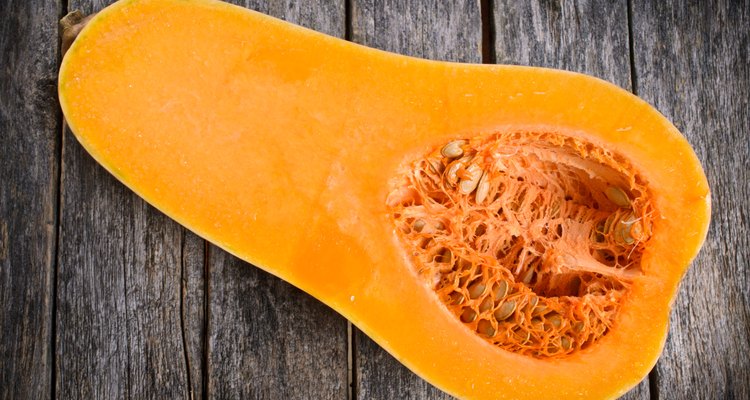
zia_shusha/iStock/Getty Images
Although you may cast out the seeds in vegetables such as acorn squash, the seeds do provide some nutritional value. Acorn squash seeds are calorie-dense, so they can be beneficial if you are trying to gain weight. Acorn squash seeds provide a blend of protein, carbohydrates and fat, so consuming them may support a variety of fitness and body composition goals.
Calories
Acorn squash seeds are calorie-dense, as a 1 oz. serving of seeds provides 126 calories. This amount of calories comprises more than 6 percent of the suggested daily intake of 2,000 calories, and is four calories fewer than 1/2 cup of vanilla ice cream provides. If you are highly active, you can burn off the calories in 1 oz. of acorn squash seeds relatively easily; 13 minutes of playing basketball or 15 minutes of swimming laps can burn 126 calories.
Fat Content
Acorn squash seeds provide a moderate amount of fat, with each 1 oz. serving containing 5.5 g of fat. Of this fat, just 1 g comes from saturated fat, which is considered less healthy than unsaturated fat because it may adversely affect your cholesterol levels. Dietary fat is important because it provides energy for endurance activities, helps your body absorb vitamins and keeps your hair and skin healthy.
Carbohydrate Content
Acorn squash seeds are rich in carbohydrates, as each 1 oz. serving of seeds contains 15 g of carbohydrates. This amount of carbohydrates is just 1 g fewer than the amount in one 80-calorie slice of whole wheat bread. Carbohydrates fuel your body during exercise, so consuming carbohydrate-rich foods, such as acorn squash seeds, prior to athletic events may be beneficial. Additionally, research from the May 2011 issue of the "Journal of Strength and Conditioning Research" suggests that combining carbohydrates with protein after exercise can improve the quality of future workouts.
Protein Content
Acorn squash seeds provide moderate amounts of protein, as a 1 oz. serving of the seeds contains 5 g of protein. Protein aids in the development and maintenance of muscles and other tissues throughout your body, so it's important to consume protein every day. MedlinePlus suggests eating 50 g to 65 g of protein each day.
Related Articles
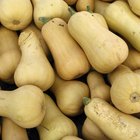
How Many Calories Are in Butternut ...
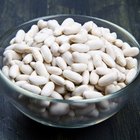
Cannellini Beans for Weight Loss
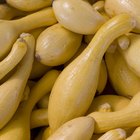
How to Clean Butternut Squash

How to Cook a Turban Squash

The Average Weight of a Boiled Egg

Baked Cubed Squash

Benefits of Shea Butter and Coconut Oil ...

Calories in Cheese Cubes
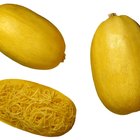
Spaghetti Squash Cooking Tips

Bible Study Activities for Young Adults
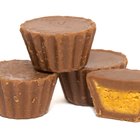
Nutritional Information for Reese's ...
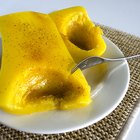
How to Cook Buttercup Squash
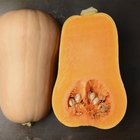
Butternut Squash Seeds Nutrition
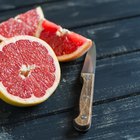
What Are the Benefits of Grapefruit for ...

How to Slow Cook Pork Chops & Vegetables

Nutrition Information on Blueberries
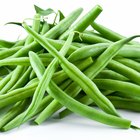
Nutritional Value of Dehydrated Green ...

Which Vegetables Produce the Most ...
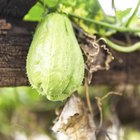
How to Grill Chayote Squash
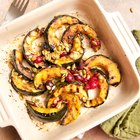
How to Grill Acorn Squash
References
- LIVESTRONG.COM MyPlate: Calories in Roasted Acorn Squash Seeds
- LIVESTRONG.COM MyPlate: Calories in Vanilla Ice Cream (Breyers)
- Mayo Clinic; Exercise for Weight Loss: Calories Burned in 1 Hour; December 2009
- MedlinePlus; Dietary Fats Explained; May 2011
- LIVESTRONG.COM MyPlate: Calories in Whole Wheat Bread (Kroger)
- "Journal of Strength and Conditioning Research"; Postexercise Carbohydrate-Protein Supplementation Improves Subsequent Exercise Performance and Intracellular Signaling for Protein Synthesis; L. Ferguson-Stegall et al.; May 2011
Resources
Writer Bio
Brian Willett began writing in 2005. He has been published in the "Buffalo News," the "Daytona Times" and "Natural Muscle Magazine." Willett also writes for Bloginity.com and Bodybuilding.com. He is an American Council on Exercise-certified personal trainer and earned a Bachelor of Arts in journalism from the University of North Carolina.
Photo Credits
zia_shusha/iStock/Getty Images